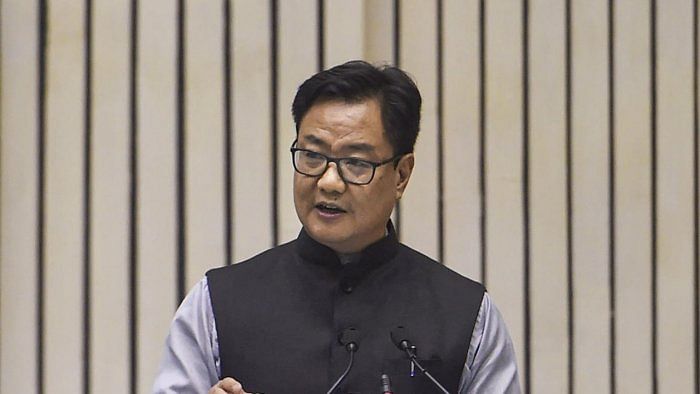
Union Law Minister Kiren Rijiju has written to Chief Justice of India D Y Chandrachud suggesting to include the government's representative in the process of picking up judges.
Amid the row between the Centre and judiciary over the appointment of judges, the Law Minister’s letter could be seen as the latest in the series of criticism of the Collegium system, which is headed by the Chief Justice of India and comprising four other seniormost judges.
The letter sought the inclusion of a central government's nominee in search-cum-evaluation committee, as part of the Memorandum of Procedure to be formulated in terms of the Supreme Court's judgement in the National Judicial Appointment Commission Act case.
"This is precise follow-up action of the direction of the Supreme Court Constitution Bench while striking down the National Judicial Appointment Commission (NJAC) Act. The SC Constitution bench had directed to restructure the MoP of the Collegium system," Rijiju said in a tweet.
As Delhi Chief Minister Arvind Kejriwal said, “This is extremely dangerous. There should be absolutely no government interference in judicial appointments”, Rijiju responded by the tweet: “I hope you honour the court's direction!"
In another tweet, he said, “The contents in the letter to the CJI are exactly in conformity with the observations and directions of the Supreme Court Constitution Bench. Convenient politics is not advisable, especially in the name of the Judiciary. The Constitution of India is supreme and nobody is above it”.
The January 6 letter reportedly emphasised that the government is an “important stakeholder in the process of appointment of judges in the Supreme Court and High Courts” and therefore, its views should also find a place in preparation of the panel of names who are eligible for being appointed as judges of the constitutional courts.
Also Read — Collegium system & its conundrums
The letter also cited previous missives sent to the SC collegium in 2017, 2018 and 2021 regarding putting in place the Search-cum-Evaluation panel, which would institutionalise the process by creating a pool of names that will be forwarded to the Collegium for finalising the appointments.
In October 2022, speaking at a media event, Rijiju strongly criticised the Collegium system of appointment of judges, saying the people of the country are not happy with the system and it is the job of the government to appoint judges as per the Constitution.
Nowhere in the world except India is there a practice that judges appoint their brothers as judges, he said.
The Minister had earlier too at a conference in Udaipur said that there was a need to rethink the Collegium system of appointments to the higher judiciary.
On November 28, 2022, the Supreme Court had taken exception to Rijiju’s comments on the Collegium system of appointing judges, saying it should not have happened.
Subsequently, Vice President Jagdeep Dhankar had described the Supreme Court's 2015 Constitution bench's decision declaring the National Judicial Appointment Commission as unconstitutional, "a glaring instance of severe compromise of parliamentary sovereignty and disregard of the mandate of the people".
In 2014, the Narendra Modi government brought the law replacing the Collegium system with an appointment Commission also comprising Law Minister and an eminent jurist. The law, which was also ratified by over 20 States, was declared unconstitutional by a Constitution bench.
However, the court had agreed that the existing system of judicial appointment required certain reforms and agreed to review the Memorandum of Procedure to address concerns with respect to some aspects, including eligibility criteria, measures for transparency, the establishment of a Secretariat, and a complaint mechanism.
